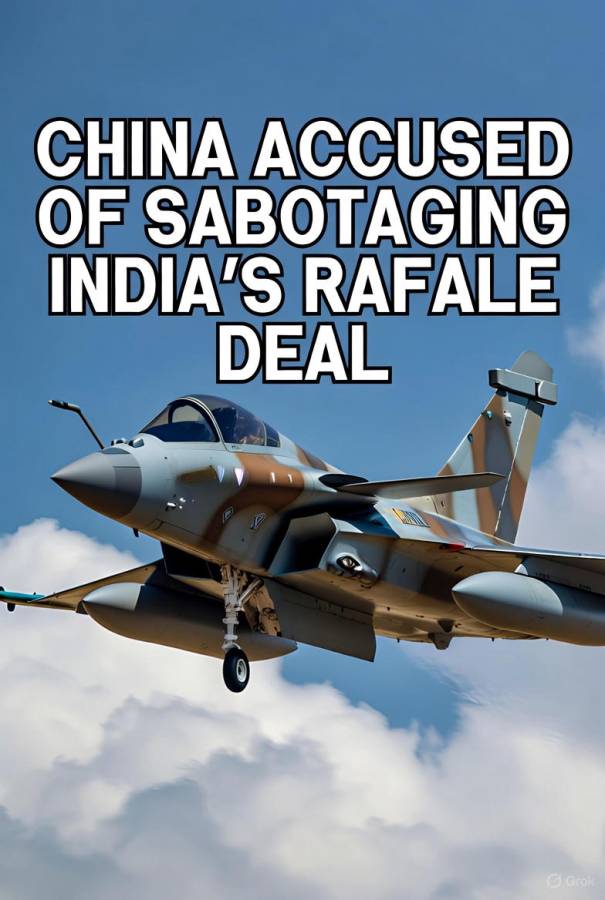
A new layer of strategic tension has emerged in South Asia’s already complex geopolitical landscape, with intelligence reports alleging that China carried out a coordinated effort to undermine India’s defence procurement. Following heightened border friction after the India Pakistan clash in May, Beijing is believed to have launched a sophisticated disinformation campaign aimed at discrediting New Delhi and obstructing the sale of the French-made Rafale fighter jet to foreign buyers. If these assessments are accurate, they reveal how far the Sino Indian rivalry has expanded. The competition now appears to stretch beyond border disputes and into global arms markets as well as the increasingly influential arena of information warfare.
The Anatomy of an Information War
According to the reports, the core of the alleged Chinese operation involved the strategic use of fake social media accounts, targeted messaging, and propaganda designed to cast doubt on India’s military capabilities and the advanced hardware it has chosen to acquire. Investigators believe Beijing’s objective was not only to damage the global perception of the Rafale aircraft but also to elevate its own J 35 fighter jet as a stronger and more attractive alternative.
This information offensive was not restricted to the immediate South Asian region. It reportedly reached key defence customers in Southeast Asia, where China is said to have made quiet but direct overtures to Indonesian authorities. These efforts were aimed at persuading them to reconsider their interest in purchasing Rafale jets. This combination of undermining a competitor while boosting one’s own product reflects a more assertive and often discreet approach to defence exports that the Chinese state is increasingly willing to pursue.
Parallel to this alleged campaign was a visible strengthening of defence cooperation between China and Pakistan, India’s principal strategic rival. Their partnership has grown far beyond simple military exchanges. Both nations now appear to be moving toward deeper coordination of their security and strategic frameworks. Over the past year, they have carried out several high profile joint exercises, including a major counterterrorism drill held in November and December 2024. This was followed by Pakistan’s prominent naval exercise, AMAN 2025, in February. The participation of the Chinese Navy in this event added a clear maritime dimension to their expanding strategic alignment.
Viewed together, the reported covert effort to sabotage India’s defence outreach and the public consolidation of the Sino Pakistani military axis signal a significant escalation in the regional power dynamic. China’s readiness to shape foreign defence decisions through information tactics, combined with Pakistan’s growing reliance on Chinese military presence and cooperation, paints a picture of a shifting strategic balance in South Asia.
Artificial Shores: Pakistan’s Deep Sea Energy Ambition
In another development with major long-term implications for the region, Pakistan is preparing to launch an ambitious deep sea energy project aimed at strengthening its future energy security. State owned Pakistan Petroleum Ltd. has announced plans to construct an artificial island off the southern coast near Karachi. The man-made island will serve as a base for large-scale deep-sea oil and gas exploration and drilling.
The initiative comes at a time when global interest in offshore hydrocarbon exploration is rising sharply. Senior PPL officials, including General Manager Shahid Ratan, have stressed the importance of this effort and noted that offshore drilling is gaining strong momentum worldwide. Pakistan’s sense of urgency has grown following the confirmation in July of substantial oil reserves in the country’s southern region. The offshore exploration license for the block was awarded to PPL and its international partners earlier this year. Construction of the artificial island is expected to progress quickly, with drilling projected to begin soon after the structure is completed.
If successful, the project could reshape Pakistan’s long term energy outlook by reducing its dependence on imported fuels and strengthening domestic energy stability.
A Region in Strategic Flux
Together, these developments illustrate the rapidly evolving environment in South Asia. The alleged Chinese interference in India’s defence engagements and Pakistan’s large scale push for deep sea resource development reveal a region increasingly defined by competition for military advantage and energy security. Traditional alliances, information campaigns, and ambitious infrastructure projects now intersect in ways that continue to shape the future balance of power.





















